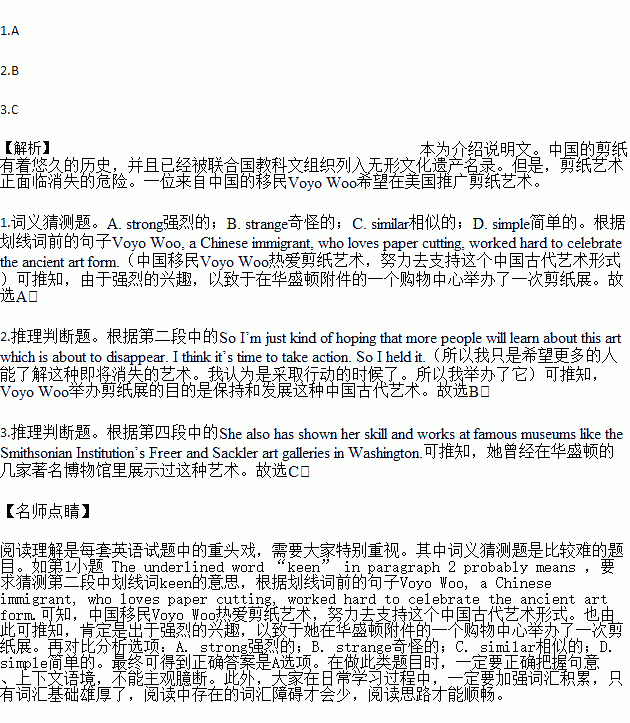题目内容
The UNESCO has recognized the Chinese art of paper cutting on its Intangible Cultural Heritage List. But paper cutting is at the risk of disappearing.
Voyo Woo, a Chinese immigrant, who loves paper cutting, worked hard to celebrate the ancient art form. With a keen interest in paper cutting, Ms Woo held a paper cutting exhibition at a shopping center near Washington. “I really love it. I get so much fun by doing it. So I’m just kind of hoping that more people will learn about this art which is about to disappear. I think it’s time to take action. So I held it.”
Voyo Woo began to study paper cutting when she was a 14-year-old girl in southeastern China. Voyo Woo’s teacher gave her extra training after class because Voyo Woo discovered a special love for it. Later, her beautiful paper cuttings won second prize in a national painting competition. “Paper is the easiest material that you can find. You can just turn it into beautiful art. I think it is like magic to me.”
Ms Woo came to the US after she finished college in 2008. She has been invited to show the art at a wide collection of events. She also has shown her skill and works at famous museums like the Smithsonian Institution’s Freer and Sackler art galleries in Washington.
“I saw so many people coming to me and asking me. They were amazed. I think it’s important to introduce the art form to American people or anyone who is interested.”
Ms Woo placed examples of her art around her as she displayed paper cutting at the shopping center. Ann Russ, a shopper, was attracted by the nature of the work. She said it put her at ease. “I like to know about Chinese art, specifically because it’s almost relaxing to put that much effort into it,” Russ said.
1.The underlined word “keen” in paragraph 2 probably means .
A. strong B. strange
C. similar D. simple
2.Why did Ms Woo hold a paper cutting show?
A. To make money for her further education.
B. To keep and develop the ancient Chinese art.
C. To show off her perfect skill in paper cutting.
D. To explain paper cutting is a real art in China.
3.What can we know about Ms Woo according to the text?
A. She went to the US mainly to teach the art.
B. She will come back to China to study the art.
C. She once showed the art at several museums in Washington.
D. She once held a competition for American paper cutting lovers.
 阅读快车系列答案
阅读快车系列答案

 oblem. Peter became dependent on this cup because ever since he received the gift he would only drink water from the exact type of little blue cup. Over 12 years, Peter refused to drink water without the cup. Steven was worried about this because their current cup could break soon and he needed to find a replacement for his son to drink with. The problem was that the cup was no longer being produced.
oblem. Peter became dependent on this cup because ever since he received the gift he would only drink water from the exact type of little blue cup. Over 12 years, Peter refused to drink water without the cup. Steven was worried about this because their current cup could break soon and he needed to find a replacement for his son to drink with. The problem was that the cup was no longer being produced. ),并在其下面写出该加的词。
),并在其下面写出该加的词。